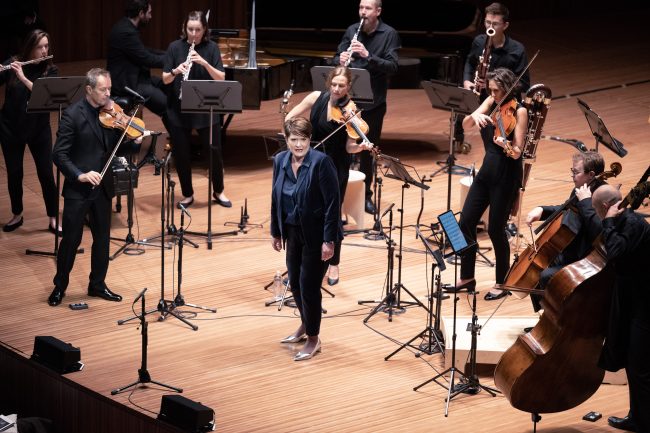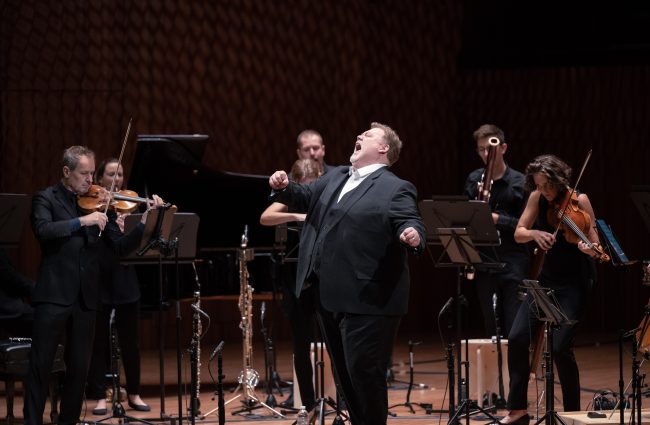May 15, 2024
Review by Paul Neeson (Arts Wednesday)

Two of Australia’s biggest musical exports in mezzo-soprano Catherine Carby and tenor Stuart Skelton, return home for a season of late romantic masterpieces with the Australian Chamber Orchestra. Works by Richard Wagner, Alma Mahler-Werfel and Gustav Mahler were all arrangements for chamber orchestra, reducing the massive orchestrations of fin de siècle symphonies or embellishing the simple piano and voice songs in the case of Alma’s Drei Leider.
The program began with Richard Wagner’s Sygfried Idyll. He composed this tone poem in 1870 as a birthday and Christmas present for his wife, Cosima (who happened to be the daughter of Franz Liszt, another great romantic composer). While not technically an arrangement, the work utilises pastoral themes from his opera Siegfried which he was working on concurrently. The bird calls and bucolic melodies especially in the woodwinds and horns are at times redolent of the wind writing in Mahler’s Symphony No.1 (composed 18 years later). It is not the grand mythical music of his operas, but more an intimate quiet moment in the Wagner family’s life.

After a short break Catherine Carby took the stage in a glistening turquoise gown. Quite used to operatic roles, she was relaxed and in control engaging the audience with an aura of composed grace. Alma Mahler-Werfel is thought to have composed between 70 and 100 songs. Unfortunately only 16 have survived. The Three Songs in this concert , which were composed before she married Gustav Mahler, only survived by a quirk of fate. Mahler told his wife there was only room in this family for one composer and she would have to forego her creativity. Later on, when he heard some of her songs being performed, he relented and organised to have five songs published, thus preserving them for posterity.
The songs tell of a brief love story: Midsummer Night (a furtive meeting in a dark forest), The Silent Town and I feel warm and close with you. Originally scored for voice and piano, we heard an arrangement for chamber orchestra by English composer David Matthews, commissioned for this tour. While the piano was still present (Stefan Cassomenos) the added orchestral colour created a visual illusion of autumnal colour and pastoral scenery complete with bird call and lullaby embellishing the lyric.

After interval it was time for Das Lied von der Erde, (Song of the Earth), Mahler’s master song cycle. The six movements were sung by Stuart and Catherine alternately. Themes of sublimated drinking, loneliness, youth, beauty and separation set the scene juxtaposing earthly pleasures and bitter realities. Most of Catherine’s songs reflected the bitter realities, while Stuart had all the fun (drinking and shouting, but of course singing with the most pure tenor).
This was the first time I have heard the Schoenberg arrangement for chamber orchestra, a very pared back version from the massive orchestration of Mahler. (A curious note of history – while Schoenberg was arranging this late romantic masterpiece, he was already developing his twelve-tone technique which ultimately saw the demise of the romantic harmonic paradigm.) While his arrangement distilled all the essence of Mahler, the musicians had to do a lot more work to compensate for the lack of numbers. The woodwinds did a lot of the heavy lifting, each doubling with the larger or smaller versions of their instrument – piccolo, cor anglais, bass clarinet and contra bassoon. Extra colour came from the inclusion of harmonium, celesta (Donald Nicolson) and mandolin (Stephen Lalor). And as with a lot of Mahler’s music there is always a dance ready to take flight, whether it be a bucolic dance on an alpine riverbank, or a macabre rite in a dark forest.
A standout moment was the ‘duet’ between Catherine Carby and flautist Sally Walker, a moment of sheer beauty and mutual musical respect, vocal and instrument sublimely interwoven floating in then out upon the rarified air of a Concert Hall mesmerised and enchanted by what they were hearing and seeing. For those familiar with the larger orchestral original, the chamber version was emphatically a more intimate experience given the lush, sweeping strings of a large orchestra were simply not there, instead we found charm and finesse in a bare minimum: string quartet plus bass. But the final movement Der Abshied (the Farewell) had us spellbound until the final dying notes had long faded to silence.
Listen to a recent interview with mezzo-soprano, Catherine Carby below: